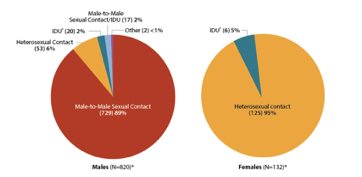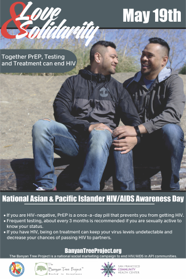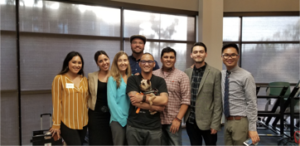By Brian Ragas, Communications Manager, San Francisco Community Health Center
In 2005, San Francisco Community Health Center (formerly API Wellness) spearheaded the first National Asian Pacific Islander (API) HIV/AIDS Awareness Day. It’s hard to believe how far we’ve come as a community fighting against HIV and for the rights of the LGBTQ community and people of color since then. We’ve made gains I never thought we’d witness, such as the right to marry who you love and new, exciting HIV prevention tools like Pre-Exposure Prophylaxis (PrEP) and Post Exposure-Prophylaxis (PEP). Our accomplishments were laudable.
Today is a different day, however, and we are faced with a hostile and aggressive political climate that looks to unravel all that we have worked so hard for. Communities of color continue to bear the brunt of the HIV epidemic and are less likely to use innovative HIV prevention tools like PrEP/PEP. The same holds true for API communities. The environment we find ourselves in is cause for grave concern.
Recent data shows that Asians accounted for two percent (959) of the 40,040 new HIV diagnoses in the United States and six dependent areas in 2015. Gay and bisexual men accounted for 89 percent (729) of all HIV diagnoses among Asian men and among Asian women, 95 percent (125) of HIV diagnoses were attributed to heterosexual contact.
 Complementing these figures is the fact that API’s have the lowest HIV testing rates for all races and ethnicities: 66.5 percent of Asian Americans and 43.1 percent of Native Hawaiian and Other Pacific Islander (NHOPIs) have never been tested for HIV. Asian transgender individuals, another high-risk group, have the lowest rates (49 percent) of testing out of all racial and ethnic groups.
Complementing these figures is the fact that API’s have the lowest HIV testing rates for all races and ethnicities: 66.5 percent of Asian Americans and 43.1 percent of Native Hawaiian and Other Pacific Islander (NHOPIs) have never been tested for HIV. Asian transgender individuals, another high-risk group, have the lowest rates (49 percent) of testing out of all racial and ethnic groups.
As advocates in this community we know that stigma remains one of the biggest barriers preventing APIs from getting tested. Many A&PIs feel significant shame and discomfort around the topics of sex and HIV/AIDS and therefore do not speak of it. It starts now that we must end the silence.
It was our awareness of this stigma that led San Francisco Community Health Center to launch The Banyan Tree Project, a national campaign that reduces the levels of shame APIs have around HIV/AIDS. This year we adopted the slogan “Love & Solidarity: Together PrEP, Testing and Treatment can end HIV” to highlight these prevention tools to help get to zero on new HIV infections.

This year we are encouraging API transgender individuals and young men having sex with men (two high-risk groups that historically have low PrEP adoption rates) to talk about HIV/AIDs, to get tested, and to speak with a provider to see if PrEP is right for them. If you are HIV-positive we encourage you to get on treatment right a way to reduce your viral load to undetectable levels and not pass the virus.
We must continue to have these conversations and not perpetuate stigma around HIV Testing, PrEP, and Treatment. We need to celebrate when have victories when we bring community together to discuss these issues. I’m very happy to report that San Francisco Community Health Center just held its annual National Asian and Pacific Islander HIV/AIDS Awareness Day on May 10 at the University of California, Irvine where this project was 100 percent initiated by students on campus to give life to the epidemic in the community.
We vehemently hope that other community members in the API community and allies who wish to support observe May 19. The Banyan Tree Project put together a toolkit for organizations or individuals to put on their own events either big or small. Under the resource section of the website, the toolkit provides posters, factsheets on HIV in API communities, one on PrEP and another on stigma all available to download. Please contact The Banyan Tree Project for more information: info@banyantreeproject.org
National API HIV/AIDS Awaren ess Day
ess Day
University of California, Irvine
May 10, 2018